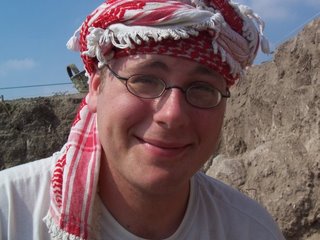
This is another article for the good news, Its all copyright, please ask permission before quoting. Thanks.
I took part in an archeological excavation for a month last summer. I was located in the beautiful north east (the Jezreal Valley) just south of Bet Shean at Tel Zaharah. This past summers dig was the first excavation of Tel Zahara. Because it was the first season, it was an exciting with unlimited possibility. While we didn’t exactly find what we were looking for, we did make a few discoveries, and while it was nothing on an Indiana Jones scale, it was great a great experience and I am happy I had the chance to participate.
During the excavation, we were housed nearby at the guesthouses located at Kibbutz Nir David which is across the road from the site. It’s a wonderful place to unwind after a day of digging, with unparalleled facilities. In and around the Kibbutz, there is a horse ranch, an Australian wildlife and Kangaroo Park, sports complex, and a river perfect for fishing and swimming. Life on an excavation is a combination of hours of stress and hard work outdoors, meeting new friends, relaxing, and of course, washing pottery. People come to excavations in Israel from all corners of the world, of all ages, and all backgrounds. I was surprised to find at my first excavation a couple years ago, that many of the volunteers and students were not even archeology majors. People come to excavations because of many varied interests, whether it is the history, religion, digging, vacation, etc. Not everyone realizes what they are getting into on a dig, its much more than a vacation, its actual physical labor, which can be extremely hard in the blazing heat, but I guess that just makes it all the more fun. In addition to digging, many excavations also run a field school which teaches the basics of excavation techniques, technical skills, paperwork, pottery, archeology, a bit of history and many other things. Every day is a great hands-on learning experience; often you are the first person to unearth artifacts which have been buried for literally thousands of years. Excavations can be a lot like summer camp with digging, there is a real sense of camaraderie which develops when everyone is digging for eight hours a day together and living the same experience. While each excavation’s schedule varies, most follow the general idea of the excavation I was on last summer. Wake up is 4-4:30am, crawling out of bed, getting dressed, eating a slice of bread and making it to the bus is usually the major challenge of the day. We usually dig till noon with half an hour off for breakfast and a break at 11am. While working in the sun without a shade can be hard, wearing the right hat, sunscreen and plenty of water make is much easier to dig without getting overheated. I was recently told that while in Saudi Arabia you can stick a shovel in the sand and hit oil, we stick a shovel in the ground and pull out antiquities. Its amazing what people find and what pottery shards (or even intact vessels) can tell us thousands of year’s later about things like trade, population, area politics, etc. This past season at Tel Zaharah, we had a team from Poland, volunteers from all over the US, and supervisors from Denmark, Jordan, and Kentucky. The majority of volunteers were from Montana. A dig is a fantastic place to meet new people and make new friends, and a great way to really experience Israel, the land and the history.

